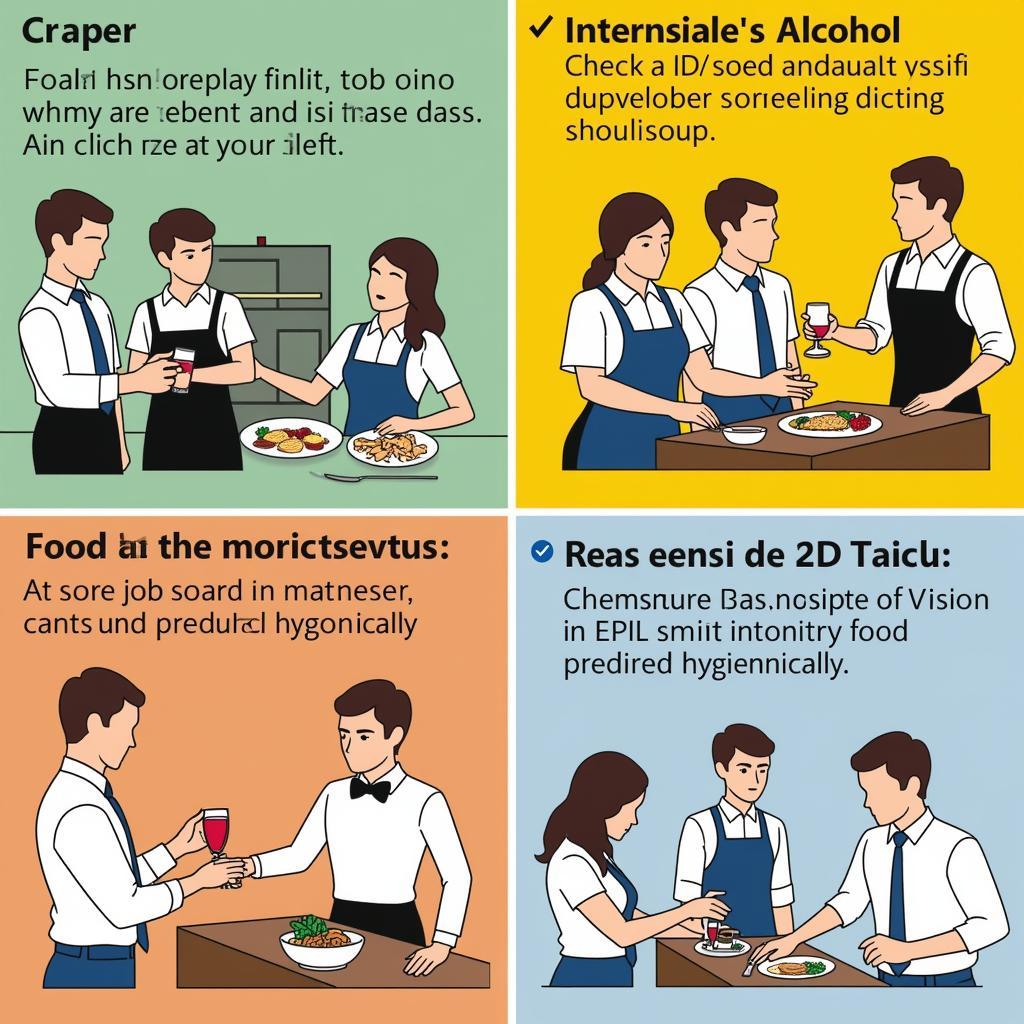Getting your Food Handler And Alcohol Server Certification is more than just a formality; it’s a crucial step towards ensuring public health and promoting responsible alcohol service. This guide provides a comprehensive overview of everything you need to know about these certifications.
Why Food Handler and Alcohol Server Certification Matters
Foodborne illnesses are a serious public health concern. Improper food handling can lead to contamination and outbreaks, affecting countless individuals. Similarly, irresponsible alcohol service can have devastating consequences, including drunk driving accidents and alcohol-related violence. These certifications equip individuals with the knowledge and skills to minimize these risks. They teach safe food handling practices, proper hygiene, and responsible alcohol service techniques.
Having these certifications demonstrates your commitment to safety and professionalism. It not only protects the public but also enhances your credibility and employability in the food and beverage industry. Many establishments require these certifications as a prerequisite for employment, recognizing their value in maintaining a safe and responsible environment.
Navigating the Certification Process
The specific requirements for food handler and alcohol server certification vary by location. Check with your local health department or alcoholic beverage control board for detailed information on the process in your area. Generally, the certification involves completing an accredited training program and passing an exam. These programs cover topics such as food safety principles, personal hygiene, preventing cross-contamination, recognizing signs of intoxication, and legal responsibilities of alcohol servers.
 Online training for food handling and alcohol serving.
Online training for food handling and alcohol serving.
Tips for Obtaining Your Certification
- Research approved training providers: Ensure the program you choose is recognized by your local authorities.
- Study the course materials thoroughly: Understanding the concepts is crucial for passing the exam and applying the knowledge in real-world scenarios.
- Practice safe handling techniques: Develop good habits during the training to prepare yourself for the workplace.
- Stay updated on regulations: Food safety and alcohol service regulations can change, so it’s essential to stay informed about any updates.
The Benefits of Certification for Businesses
Beyond individual benefits, these certifications also bring significant advantages for businesses. They contribute to a safer work environment, reducing the risk of foodborne illness outbreaks and alcohol-related incidents. This, in turn, can lead to improved customer satisfaction and a positive reputation in the community. Moreover, certified staff can demonstrate compliance with regulations, minimizing potential legal liabilities. Investing in employee training and certification is a smart business decision that protects both the public and the business itself.
arizona food handler and liquor certification
Common Questions About Food Handler and Alcohol Server Certification
How long is the certification valid?
The validity period varies by location. Typically, certifications are valid for a few years and require renewal.
What happens if I fail the exam?
Most programs allow you to retake the exam after a certain period.
Is online certification accepted?
Many jurisdictions accept online certifications, provided the program is accredited by the relevant authorities.
What topics are covered in the alcohol server training?
The training covers responsible alcohol service practices, including checking IDs, recognizing signs of intoxication, and refusing service to minors or intoxicated individuals.
Do I need both certifications if I work in a restaurant that serves both food and alcohol?
In many cases, yes, both certifications are required for individuals handling food and serving alcohol.
 Food and alcohol safety practices in a restaurant setting.
Food and alcohol safety practices in a restaurant setting.
Conclusion
Food handler and alcohol server certification are vital for protecting public health and ensuring responsible practices in the food and beverage industry. By obtaining these certifications, individuals demonstrate their commitment to safety and professionalism, enhancing their career prospects and contributing to a safer environment for everyone. Obtaining your arizona food handler and liquor certification is a valuable investment.
For support, contact us at Phone Number: 02437655121, Email: minacones@gmail.com Or visit us at: 3PGH+8R9, ĐT70A, thôn Trung, Bắc Từ Liêm, Hà Nội, Việt Nam. We have a 24/7 customer support team.